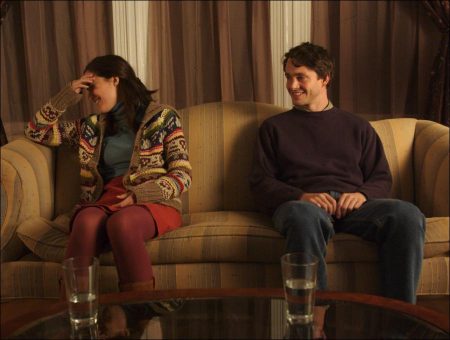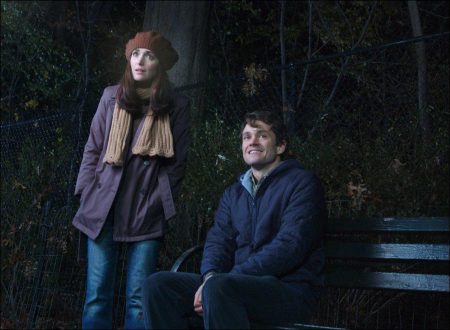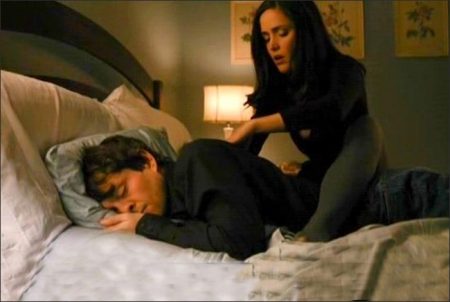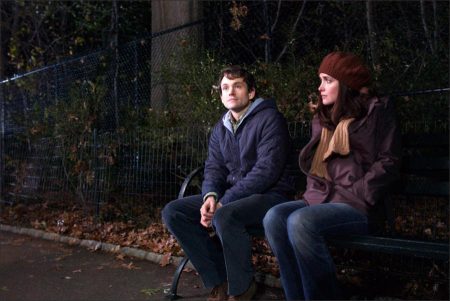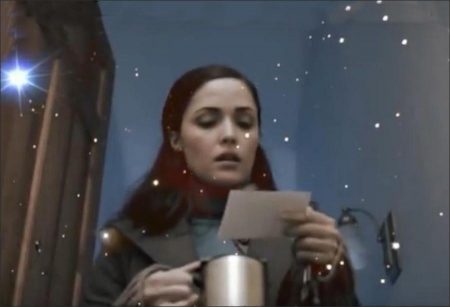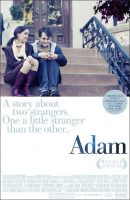Theory of Mind
Adam Movie Trailer. Theory of Mind: Noun. 1. the ability to conceive of mental states – beliefs, desires and intents -in others and to understand that your beliefs, desires and intents are different from everyone else’s. What happens when you fall in love with someone for whom love itself is an alien concept? In the unconventional romantic comedy, ADAM, the tale of a romance between a bright, sophisticated young woman and a mysterious, sheltered brilliant young man becomes a humor-laced excursion into the riddle of romantic chemistry and the moving ways people find to connect, even when they can’t possibly see the world in the same way.
This love affair between Adam and Beth, unique as it is in the world of cinema, contains elements we all can relate to, even if we’re “neurotypical.” “Really, the bottom line is that all relationships are difficult, and full of misunderstandings, because that’s just how we’re wired,” laughs writer and director Max Mayer. “It’s through no fault of our own, really. But I think a story like this gets at the idea that we also all have a kind of innocence at our core where we can still touch each other.”
The film marks the breakout feature film from Mayer, who has directed more than 50 new plays Off-Broadway and around the country, and has also directed for some of television’s most prestigious shows, including “Alias” and “The West Wing.” His inspiration for ADAM came, rather appropriately, out of the blue. One day, Mayer was listening to the radio when he was suddenly riveted by a story about a man living with Asperger’s Syndrome, an increasingly common form of high-functioning autism that is hallmarked by an inability to read what other people are thinking and feeling. Those with Asperger’s Syndrome can be highly intelligent, even off-the-charts brilliant, but are often socially cut-off because they perceive ordinary human behavior as strange, irrational and even wildly incomprehensible. They are, essentially, “mindblind.”
It struck Mayer that we all get a dizzying glimpse at that kind of confusion in romantic relationships – when we each become bumbling amateur detectives trying to figure out this total stranger that makes our heart beat faster — and he couldn’t help but wonder what it would be like for a person who has Asperger’s Syndrome to carry on a romance with someone who doesn’t. The concept seemed rife not only with relatable mishaps but a vivid new way to view the pinnacle of human emotions — from the fresh perspective of someone who sees emotion differently.
Thus was born the character of Adam. If women are from Venus and men are from Mars, Adam appears to be from another galaxy entirely, but that doesn’t stop him from going after his own, albeit disaster-prone, version of romance with remarkable spirit and courage. “When I heard that man on the radio talking about Asperger’s Syndrome, I realized that not only was he describing his own very moving journey but also something about the general human condition,” says Mayer.
“We are all trapped in our heads – and can only make guesses about what another person’s experience is of the world, even those we love. That’s what inspired me to begin ADAM. As I started writing, I realized that Adam’s relationship to Beth is an extreme version of a very common dilemma we all face in life: the urge for an intimate connection to that which is necessarily strange – another person with their own view of the world.”
A long-time New Yorker, Mayer wrote ADAM as a classic Manhattan boy-meets-girl-ina- building romance – but with a unique twist. After all, this boy and this girl have more than just the usual circumstantial obstacles standing between them; they have the mystery of the human brain itself.
To create Adam as a fully-fledged character, Mayer began by looking into what little is known today about Asperger’s Syndrome. Like Adam, those with Asperger’s have also been noted as being shockingly straight-forward truth-tellers and entirely unconcerned with social conventions. It is thought that the Syndrome has probably existed for most of human history. Indeed, it has been speculated that a number of famously “hard to understand” scientists, writers, artists and other geniuses may have had the Syndrome, including Albert Einstein, Amadeus Mozart, Isaac Newton and James Joyce, among others.
While Asperger’s Syndrome can be isolating and debilitating for some, many people who live with it also excel in achievements, especially in our increasingly high-tech world. Today, there is now a growing, empowered community of people with Asperger’s Syndrome, who refer to themselves as “Aspies.”
“Aspies don’t talk about it in terms of a handicap, they just call the rest of us `neurotypicals,’” points out Mayer. “When I went to some Asperger’s meetings, I saw a wide spectrum of people but basically they all share the same trait of not being able to pick up on emotions from facial expressions or instincts. That part of the world is more mysterious to them. Yet, the Syndrome is also associated with a number of verifiable geniuses.”
Mayer sketched Adam as someone at the upper end of the spectrum – highly intelligent, capable of leading his own offbeat, independent life yet isolated from romance because he’s never known how to reach out of his inner world – that is, until he is forced into it by his new neighbor Beth’s interest in him. “Adam functions well and has a lot of really cool interests, like astronomy and theatre, but he’s essentially been cut off from the outside world. He’s doing OK but realizes it isn’t the way to be when he bumps into Beth,” explains Mayer.
In creating Beth, Mayer crafted a volatile chemical mix with someone who is Adam’s complete polar opposite – a highly emotional, intuitive, socially vivacious woman who is looking for a deeper kind of love than she has ever known. As a veteran of the New York dating scene, Beth thinks she has seen it all. But Adam is an experience unto himself. Initially attracted to Adam physically, she is taken aback to find that his odd behavior and strange intensity draws her in even further, and she has to admit, no matter how different he is, she’s never felt like this with anyone.
“Beth meets Adam before there’s any label on him, so by the time she learns about his Asperger’s Syndrome, she’s already interested enough in him as a human being that it just becomes another piece of information,” says Mayer. “Of course, she thinks he is cute, but when they get to know each other better, it’s his honesty that really gets to her. It’s something she’s really thirsty for in her life and it’s refreshingly different from what she’s had in her past relationships.”
The collision of Adam and Beth is destined to create sparks, but it also pushes both of them to places they didn’t know they could go. “They each find something liberating in the other,” Mayer explains. “For Adam, Beth is like a graduate course in Human Relations, he learns so much about how to deal with the world from her. For Beth, Adam shows her how to freely express herself, how to live honestly, how to finally be true to who she is.”
When Mayer’s long-time theatre producing partner Leslie Urdang read his screenplay, she was thrilled to make this their first motion picture together. She brought in her Olympus Productions partner, Dean Vanech, and independent producer Miranda de Pencier to complete the team. “What drew us all to this script is that it’s a love story that hasn’t been told before but is also about something we all experience – that longing to make a connection,” Urdang says. “I’ve known Max a long time and I know how smart he is and what a big heart he has and that heart is really up there on the screen.”
Adds de Pencier: “This is a very fresh story about love, prejudice and communication. It’s about how hard it is to connect, how hard it is to relate and yet, how in the end, we’re all human and will keep searching for some kind of love. I think what everyone responded to so enthusiastically is that there is both a lot of emotion and a lot of fun involved.”
As a mysterious young man who retains a disarming, tell-it-like-it-is innocence, Adam joins a short list of memorable autistic characters in movies, including Dustin Hoffman in RAIN MAN and Peter Sellers in BEING THERE. But Adam is also quite different because he is a character who has been placed in the midst of a world where people with neurological differences are almost never seen, almost forbidden – that of the romantic comedy – as he does what no one would ever expect him to do: fall for a seemingly unattainable girl in spite of all the mindboggling obstacles.
To cut to both the heart and the humor of Adam’s unexpected journey, Max Mayer understood that he was going to need a very particular breed of actor. He needed someone who would be attractive at first sight yet also capable of going deeply, no holds barred, into a different reality, one in which the typical emotional complications of love can’t get any more complicated. The writer-director was drawn early on to Hugh Dancy, a rising British star of stage, television and screen whom Americans are just getting to know better after recent roles in THE JANE AUSTEN BOOK CLUB and CONFESSIONS OF A SHOPAHOLIC.
“The first thing that drew me to Hugh as Adam was his keen intelligence,” explains Mayer. “He has an incredibly active mind and you can see that in his face. The role requires someone who can somehow `do nothing’ in a very dynamic way and I discovered that relatively few actors can do that. Hugh was different, and I think he was really able to embrace Adam because he’s a quite complicated person himself, a deeply serious actor and very curious about the world.”
Dancy also exhibited another vital quality for the role: fearlessness. Recalls Mayer: “When Hugh called me the first time he said, `I really like to take roles that scare me and this script scared the pants off me’ and I knew right when he said that, this young man would be in the fight with me the whole way – and sure enough we had a fantastic time working together.”
For producer Leslie Urdang, Dancy had just the right touch to make the delicate love story work. “He’s tender and he’s funny and he really gets to the honesty in Adam that’s so refreshing,” she says. “You can feel both his mind and his heart at work and Hugh’s so handsome and charming that he makes it easy to understand why Beth can’t walk away from Adam.”
Adds producer Miranda de Pencier: “Hugh needed to be completely open and vulnerable to play this part and he was.”
From the minute he began reading the script, Dancy was riveted by Adam. “Right from the start, Adam is a mystery,” he muses. “There’s something very human about him but he has these oddities that are hard to pin down. He’s a puzzle, and the beauty of Max’s script is that he doesn’t turn Adam’s story into some kind of medical documentary but instead into a very cleverly woven and emotional tale of a man and a woman connecting.”
Still, Dancy knew his work would be cut out for him. “I knew next to nothing about Asperger’s Syndrome so I realized if I was going to go any further with the role, I’d have to really educate myself,” he explains. “I discovered the reality is that people are really just beginning to understand it.”
In addition to reading books, searching websites and consulting with Mayer, who had done extensive research on Asperger’s while writing the script, Dancy met with several Aspies in person to get a better sense of what it’s like to live with the syndrome. “People were very generous in talking with me,” he says, “and it was invaluable to me both to listen to what they had to say and to observe them. I felt a real responsibility to do that.”
Even so, at times he felt like he was walking a high wire. He continues: “Most of the preparation for this role was quite a solitary process because Adam is so much in his own head. The challenge for me was learning to play with a whole different set of responses to typical situations. This took me way out my comfort zone because actors are all about interactions and reactions and Adam isn’t! Even after a lot of preparation, every day felt like a risk.”
In spite of the gamble, Dancy ultimately found Adam exhilarating to play. “I really had a lot of fun because there’s something so endearing about him,” he confesses. “There’s no agenda to Adam, no dishonesty, no duplicity and he consistently says the things that we all wish we could say but are barred by social conventions. I especially enjoyed the kind of strange courting he does of Beth. He is at times a very funny character but one of the keys was never stepping outside the character for the sake of a joke. Max and I both felt that we should never push.”
But the lingering question remained as to whether or not someone like Adam – moored as he is on his own desert island of altered perception — could really fall in love with Beth. Dancy says that depends entirely on your definition of love. Adam might not know how to flip head over heels, but Beth definitively tilts his view of the world.
“I definitely see ADAM as a love story between two young people in New York trying to make contact,” Dancy summarizes. “But the interesting thing about Adam is that he probably wouldn’t ask that question about falling in love because he has such a different way of viewing emotions that it wouldn’t even make sense to him in the first place!”
When Adam, newly alone after his father’s death, meets his new neighbor Beth, a strange and entirely unexpected bit of chemistry occurs. She is drawn to this unusual, smart, different man who seems so sweet and genuine compared to some of the manipulative, superficial men she has dated in the past. And yet, clearly, Adam is like no other man in the world, which means all of the modern romantic rules she knows so well are about to go out the window.
In many ways, Beth is the yang to Adam’s yin: as a school teacher and would-be writer, she’s savvy in the social world, highly attuned to emotions and has close ties, sometimes painfully close, to her family. And yet, as “normal” as she might seem, she also has her own blind spots, especially when it comes to trust.
To play Beth, Max Mayer was looking for a young woman who had that independent spirit yet could create visceral sparks with Hugh Dancy. Both qualities came across when Dancy read together with Rose Byrne, the talented Australian actress who has come to attention in the U.S. in her starring role as a young lawyer on the popular television series “Damages.”
“Rose is a lot like Beth – she’s this beautiful woman who is also eccentric and comedic,” observes Mayer. “She’s a very instinctive actor who really is driven to get at the truth. She was always stopping to ask: `Am I sad here? Am I in love yet? What’s really going on here?’ And those answers were always complicated so we would stop and talk about it and come to an understanding.”
Adds Leslie Urdang: “Rose really was surprising. I’ve been a fan of hers for a long time, but I found that her humor and quirkiness, her sensuality and curiosity in portraying a woman who could fall in love with a man like Adam was really extraordinary.”
Like Dancy, Byrne responded strongly to the screenplay. “I thought it was a tender, charming love story with characters that are unusually colorful,” she says. “I love romantic stories and human drama so I instantly felt a connection to this. And I felt that Max found just the right line between the funny moments and the tender moments.”
She understood immediately how someone like Beth could find herself attracted to a distinctive, unconventional man like Adam, without knowing anything more about what makes him so unusual. “She might seem a bit like an Upper East Side princess, but Beth is also very open-minded. She reserves judgment and that’s what allows her in the beginning to start a relationship with Adam,” says Byrne. “She’s very spontaneous and curious and that comes alive in their interaction with each other.”
It also helped that Byrne already knew someone with Asperger’s Syndrome. “I have a family friend who has Asperger’s and I think it’s becoming more common. More and more people are touched by some form of autism,” she says. “What I like about Beth is that when she finally learns about the nature of Adam’s condition, she doesn’t judge him for it because she finds so many things about him that are liberating and refreshing. His uncensored honesty is such a rare thing in this day and age and his candidness with her really, really touches her.”
Once on the set, working in sync with Dancy, an organic chemistry took over. “Hugh did such a great job portraying Adam that afterwards, I was like `oh my goodness, this is not the person I just spent the last few weeks with!’” she laughs. “He really immersed himself in the role. Which was interesting because as an actor you’re continually trying to react off the look in someone’s eyes and to their body language but Asperger’s people don’t have those qualities. So by Hugh embodying that so well, it helped to create that very unusual chemistry that Beth and Adam have.”
She continues: “I love the scene, for example, where Beth and Adam run into her parents at a play and Adam goes on and on about the history of theatre and all these obscure facts, which is such an Asperger’s Syndrome thing to do, and everyone is just completely bewildered. The film is full of that kind of comedy of errors where Adam is just being Adam and Beth is trying to keep it all together as best she can.”
As for what Adam comes to mean to Beth, Byrne says it’s almost incalculable. “Adam really shines a light into her life,” she observes, “and she has to confront her family and herself in huge ways. Their love affair is bittersweet but it is an intense and illuminating experience for both of them.”
Also joining the cast as Rose’s parents, Marty and Rebecca Buchwald, who have their own complicated relationship, are Peter Gallagher and Academy Award nominee Amy Irving. Mayer had previously worked with both in the theatre world. “I thought of Peter even as I was writing the role of Marty and he just came in and nailed the role,” says Mayer. “And I had just seen Amy in a one-woman show about the poet Elizabeth Bishop and I was so impressed that I asked her if she would play Rebecca. I was truly lucky that both were drawn to the story.”
Adds Rose Byrne: “Working with Peter and Amy was wonderful. Peter has the kind of larger-than-life personality that you really need for Rose’s father because he’s such a domineering and commanding presence in her life – and also the source of her complicated relationships with men. Peter does a great job of bringing an arrogance and duplicity to the role, so that you’re not quite sure if he’s entirely kosher, but at the same time you see his own moving difficulty in communicating his love to his daughter. And then Amy is just graceful and gracious. She has a real serenity that I think is something Rose admires in her mother and tries to bring to her relationships. I think you can look at Peter and Amy’s performances and really see how Beth is the by-product of these fascinating people. It’s very clever casting.”
Adam (2009)
Directed by: Max Mayer
Starring: Hugh Dancy, Rose Byrne, Amy Irving, Frankie Faison, Peter Gallagher, Haviland Morris, Adam LeFevre, Terry Walters, Steffany Huckaby, Susan Porro, John Rothman, Maddie Corman
Screenplay by: Max Mayer
Production Design by: Tamar Gadish
Cinematography by: Seamus Tierney
Film Editing by: Grant Myers
Costume Design by: Alysia Raycraft
Set Decoration by: Anita Chacinska
Art Direction by: Natalie Tyler
Music by: Christopher Lennertz
MPAA Rating: PG-13 for thematic material, sexual content and language.
Distributed by: Fox Searchlight Pictures
Release Date: July 29, 2009
Views: 2441
